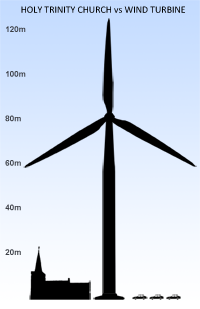- Home
- Proposals
- The Arguments
- About Us
- News
- BBC bias on climate change
- Latest News
- Climate change balance lost by BBC
- Energy Prices-The Times
- Turbines trash landscape benefit billionaires
- Global Warming Panic Over!
- Mini-Nukes the future
- The dirty secret of Britain's power madness
- Extreme weather the new Global Warming
- Tax Payers Alliance Energy view
- Britain can't afford wind power
- Fracking = prosperity?
- Its time to drill- Times leader
- Thoughtful article on Fracking
- Wind double subsidised
- Deluded energy policy
- The EU U-turn over energy
- Windfarm Wars Company in Churchover
- New noise guidance increases risk of harm
- Peter Lilley MP, Delingpole's new hero
- Shale Gas update 2013
- Maggie U-turned on Global Warming
- Devastatingly sad news
- 'smart' energy technology
- Engineers surveyed 2011
- Lord Turnbull speaks out
- Miracle shale gas
- Planning application refused!
- Warwickshire heritage beauty spot protected!
- Press
- Articles
- Letters
- How To Help
- Donations
- Letters of Objection
- New Churchover PC Objection
- New Historic England Objection
- Churchover Resident Objection
- CPRE Objection
- English Heritage Objection
- Objection by expert R&F historian
- Leicestershire County Council objection
- Warwicks CC Ecology objection
- Harborough District Objection
- Churchover PC Objection
- Bitteswell PC Objection
- Pailton PC objection
- Some other Objections sent
- Rugby BC Planning Committee
- Contact Us
Low wind speeds increase financial losses for windfarm operator
Windfarm operator the Renewable Energy Generation Group has blamed "abnormally low wind speeds" across the UK for greater-than-expected losses.
Posted in Environment, 22nd March 2011 By Andrew Orlowski •
The REG Group acquired Cornwall Wind and Power in 2005, and now operates 10 wind power sites with a (theoretical) capacity of 41.15MW. It is quoted on AIM, the London Stock Exchange's international market for smaller companies.
Losses before tax rose to £1.9m, up from £400,000 in the corresponding six-month period a year ago. In a statement, it blamed "abnormally low wind speeds" for "over £1m of lost EBITDA". The full results are here :
http://online.hemscottir.com/ir/rwe/ir.jsp?page=news-item&item=633320845083996
Despite the bullish statements, the wind industry remains vulnerable on Government kindness, in the shape of feed-in tariffs (FITs).
FITs are a form of wholesale price-fixing, introduced to stimulate investment in new energy sources.
If consumers' desire for cheap energy was allowed to be met by the market, it would lift millions of poor people out of fuel poverty. But then wind farms wouldn't be economical at all.
It's a uniquely inefficient technology. Windmills must be shut down if the wind blows too hard. And, quite often during the December cold snap, wind plants used more electricity than they generated – just when the electricity was needed the most. (Electricity is drawn from the grid for yaw control, lighting, de-icing, pumps and to power the control mechanisms.)
The current UK FIT schedule – introduced in 2009 – sees solar, not wind, as the most-specially-favoured: with 43.3p per kWh guaranteed (for retrofitted small installations).
But wind isn't far behind at 36.2 per kWh for small installations and 28p for larger ones. These are the highest in the EU, nine times higher than Denmark. The wholesale spot market only very rarely exceeds such numbers, meaning that for most of the time consumers pay more than they should.
This generosity can't go on forever. All across the EU, subsidies and sweeteners are being pulled. Germany, Spain, France, Slovakia and the Czech Republic have scaled back their FITs. Last month, the government indicated that it would too, announcing a review of solar FITs for large solar installations (large is relative here, meaning greater than 50kWh).
Two major investors that favoured solar have pulled out of the market: Ingenious Media and Matrix.
"Suddenly the rug has been pulled," observed CEO of eco-energy Good Energy Group plc.
Yet even as a method of reducing CO2 emissions, wind remains singularly hopeless.
Denmark has been the biggest European investor in wind energy, yet still gets half of its electricity from coal-fired power stations – as much as it did before. When the wind blows correctly,
Denmark is able to reduce the energy it imports from Norway's highly flexible hydro-powered network.
So it simply swaps one renewable for another – at some considerable cost.
Not all renewables are quite as harmful to humans or the economy, it should be stressed, as wind turbines.
Hydro, where you have the fjords, or can build the dams, is a reliable large-scale power source.
Geothermal energy could one day exceed it. Even burning our rubbish, instead of making the pointless and ritualistic gesture of recycling it, could provide free heat, or so a study commissioned by the former Mayor Ken Livingstone found. London's rubbish could power a quarter of London's homes.
But solar and wind are simply poor technologies that today, in the UK, simply represent a huge cost – and rigging the market to favour them simply guarantees winter misery for millions.
See http://www.theregister.co.uk/2011/03/22/wind_abnormal_fail/

